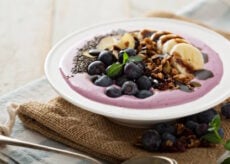3 Overlooked Bulletproof Coffee Benefits (so, drink up!)

As more and more people adopt the ketogenic diet, there’s greater curiosity about keto coffees in general and bulletproof coffee in particular. It pairs with the keto diet like peas and carrots with a laundry list of bulletproof coffee benefits. Let’s take a deeper dive into bulletproof coffee, which has earned unicorn status in some circles.
What Is Bulletproof Coffee?
If you’re not completely familiar with it, bulletproof coffee is a low-carb, high-fat coffee recipe. While there are variations, the basic version looks something like this:
- 8 – 12 ounces of brewed coffee (about 2 cups)
- 1 – 2 tablespoons butter or ghee (preferably from grass-fed animals)
- 1 – 2 tablespoons of MCT oil (MCT is short for medium-chain triglycerides. The best dietary source of MCTs is coconut oil. However, the two should not be confused or used interchangeably.)
After you have all your ingredients handy, simply put them all in a blender and let ‘er rip (for about 30 seconds) until well combined.
Because it’s relatively loaded with MCTs, low-carb, and often incorporated as part of the ketogenic diet, the list of bulletproof coffee benefits often sounds strikingly similar to keto.
The Bulletproof Coffee Benefits
The most commonly cited bulletproof coffee benefits include:
- Reduced hunger
- Steady, lasting energy
- Heightened mental clarity (i.e., reduced brain fog)
Truth be told, none of these are far-fetched. In fact, it’s pretty reasonable to experience effects like these from a cup of bulletproof coffee, which contains roughly 400 calories and 52 grams of fat. Overall, dietary fat tends to be pretty satisfying. Plus, it has no effect on blood sugar levels and may help lengthen and strengthen the energizing effects of caffeine.
What’s more, MCTs are often referred to as “functional” fats. This is due to their capacity to:
- Boost metabolic rate
- Increase fat burning
- Suppress appetite
- Energize the brain
- And cleanly and efficiently be burned as fuel
On that note, if you’re consuming a fat-only meal (like bulletproof coffee), you can absolutely expect to be burning more fat. However, that does not mean you’re necessarily losing fat (unless the balance of burning exceeds storing).
Having said that, there are some overlooked bulletproof coffee benefits, which may surprise you.
No More “Junk Food” Breakfast
Among the bulletproof coffee benefits, arguably the most impactful is what you aren’t eating. This is something those of us in the nutrition world like to call “dietary displacement.” You may be improving your overall diet quality by the process of elimination, which could lead to a wide variety of benefits.
In other words, replacing typical, heavily processed Western-style breakfast foods (such as cereals, pastries, donuts, bagels, and granola bars) with pretty much anything could be a step in the right direction.
After all, overconsumption of these high-carb junk foods is tied to obesity, type 2 diabetes, cardiovascular disease, stroke, metabolic syndrome, certain types of cancer, and more.1 To make matters worse, these food choices don’t have much satiating power. They typically result in somewhat wild fluctuations in blood sugar and actually trigger cravings. Ultimately, they leave many people reaching for another high-carb, heavily refined junk food shortly thereafter.
Keep in mind that dietary displacement works both ways. Replacing an otherwise nutritious breakfast with butter-infused coffee may not offer the same overall health benefits.
Speaking of breakfast, bulletproof coffee often goes hand-in-hand with a popular form of intermittent fasting called “time-restricted feeding.” This limits the time you can eat daily (typically to 4 – 8 hours). Funny thing is that if you’re consuming 400 – 500 calories, you’re not fasting. In fact, some would say that anything besides water—that includes plain black coffee—violates fasting.
Be that as it may, bulletproof coffee has become synonymous with skipping breakfast. And while breakfast had long been touted as the most important meal of the day, that notion has been disputed in recent years. Yet in some respects, things seem to be coming full circle. Tides appear to once again be shifting in favor of breakfast for optimizing overall health, glycemic control, insulin sensitivity, circadian rhythms, and weight management.2–8
Coffee Is AWESOME
There’s no question that my favorite of the bulletproof coffee benefits is that it helps solidify the fact that coffee is awesome. You see, despite an undeserved bad reputation, regular coffee consumption is associated with numerous health benefits. This includes reduced risk of type 2 diabetes, certain types of cancer, and some neurodegenerative diseases, such as Alzheimer’s and Parkinson’s. Coffee consumption is also associated with reduced risk of cardiovascular disease. What’s more, drinking coffee may even help you live longer.9 See, I told you it’s awesome.
Along with coffee comes caffeine, which helps boost metabolism, increase alertness, boost energy levels, improve mental and physical performance, make physically demanding tasks seem easier, and more. Coffee is much more than caffeine, however. In fact, it provides several B vitamins (e.g., thiamine, riboflavin, niacin, pantothenic acid), potassium, and manganese. And, it’s loaded with antioxidants. In fact, in some cultures, coffee is the single greatest dietary source of antioxidants—outweighing even fruits and vegetables.10
It should go without saying, however, that you need to pay attention to your caffeine tolerance. Some people are slow caffeine metabolizers, and the downside (e.g., jitters) outweigh the potential benefits. And of course, if you’re pregnant, I think you know the obvious answer.
Don’t Fear the Fat—Including Saturated Fat and Butter
Despite being demonized for years, it seems like even the staunchest, most outspoken low-fat proponents are coming to grips with the fact that dietary fat isn’t the devil it had been made out to be. It doesn’t make you fat. And it can actually have tremendous health benefits. If you’re interested in digging deeper, check out this article.
While there are many reasons for the paradigm shift, normalizing the addition of copious amounts of fat to your coffee, which used to be met with tremendous chagrin, is a pretty good indication of the movement. In other words, another one of the bulletproof coffee benefits is that it serves as a good reminder that we shouldn’t fear fat—even if it takes this to an extreme.
Along these lines, it’s now well-established that saturated fat is not associated with heart-related issues and other adverse health outcomes.11 While it’s not fair to point a finger at a single food/nutrient, in general, it seems like the onus is now being shifted toward refined vegetable oils, added sugars, and refined carbohydrates.
And bulletproof coffee benefits pretty much everyone on the planet because it has played a pivotal role in the resurgence of butter. That’s right, butter is officially back. (So long, margarine!). And you’d have to be crazy to argue that butter isn’t awesome. One noteworthy benefit of butter is that it is the best dietary source of the short-chain fat butyrate, which has numerous health benefits (e.g., gut health, appetite suppression, immune support, brain health).12
Having said all that, we should be careful not to put a halo on it as a health food. In fact, butter is well-known to increase non-HDL cholesterol as well as apolipoprotein B (apoB), which are both associated with increased risk of heart disease.13 Interestingly, this seems to relate to the churning process, which decreases levels of milk fat globule membrane (MFGM), a compound that encloses the fat found in other milk products. Along those lines, recent studies show consumption of full-fat dairy (containing MFGM) is related to less belly fat and better markers of cardiometabolic health, including blood pressure, cholesterol, triglycerides, and glycemic control.14
With all that in mind, here’s a take-home summary of the bulletproof coffee benefits and even a couple ideas that may even make it better:
- Bulletproof coffee is highly touted for reducing hunger, boosting energy levels, and enhancing mental clarity.
- Bulletproof coffee benefits many people by displacing typical breakfast foods or by simply providing nutrients where they were previously lacking. In other words, many of the bulletproof benefits may be relative to what you were—or weren’t—eating before.
- One of my favorite bulletproof coffee benefits is that it’s helped fortify coffee’s status as AWESOME.
- Nutritionists around the globe are rejoicing that bulletproof coffee has also been influential in helping people recognize that dietary fat isn’t the devil, saturated fat isn’t as bad as we thought, and butter is back (although it doesn’t necessarily deserve a halo).
- Having said that, the standard bulletproof coffee recipe lacks protein, and if you’re going to eat breakfast, it’s a GREAT idea to include some protein (at least 20 – 30 grams). Research shows a high-protein breakfast reduces appetite and cravings, improves diet quality, and leads to better body composition.
- Given that full-fat dairy may offer greater health benefits (and fewer potential negatives) than butter, maybe cream would be an even better option to mix with your coffee. If nothing else, you’d save yourself some cleanup time.







